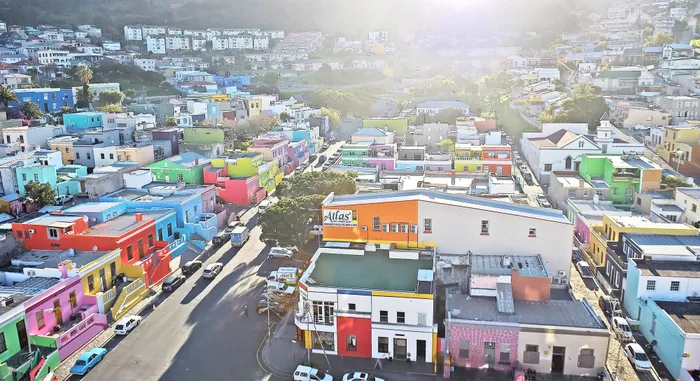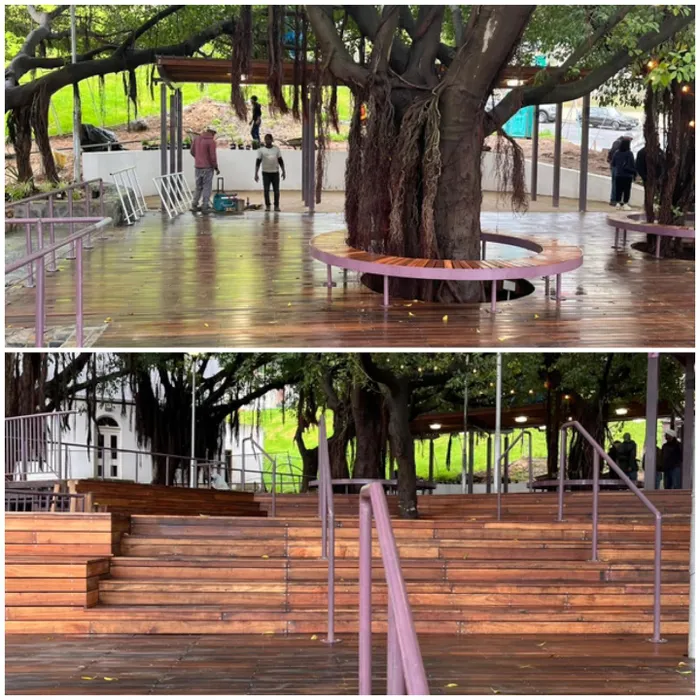Bo-Kaap Community Market: a tangible celebration of culture and heritage

An aerial view of Bo-Kaap
Image: Phando Jikelo/Afrcan News Agency/ANA
Cape Town’s Bo-Kaap, famous for its rainbow-coloured houses, cobbled streets, and rich cultural tapestry, is about to get even more vibrant. At the end of this month, the neighbourhood will launch its very own Bo-Kaap Community Market, a celebration of local culture, heritage, and entrepreneurship, taking place on 26–27 September from 9am.
Faai-ekah Ryland, resident and member of the Bo-Kaap Civic Association, said: “This market is a City initiative, but the focus is very clear: we only want Bo-Kaap traders. Whether it’s food, attire, or crafts, this is a platform for our people. Applicants must provide ID and address, which the Civic Association will check. This is an extra boost for our people and an opportunity to sustain themselves while keeping our culture and heritage alive.”
The market will feature 12 stalls, including six dedicated to food, with organisers ensuring a mix of unique offerings.
“We want one or two stalls selling cultural items, something unique," Ryland said.
“This market is about uplifting our people and showing who we really are. Bo-Kaap is not just colourful houses. People think we are rich because our homes are expensive, but the truth is, we also struggle. This is our chance to make sure tourism benefits the community.”
Ryland highlighted that Bo-Kaap’s true wealth lies in its heritage. “Yes, we have beautiful homes. We are rich in culture, in heritage but survival is a daily challenge. Tourists are everywhere, on your stoep, on your walls, they have the freedom, now we are creating a space where our community truly benefits. This market is about showing the world the heart of Bo-Kaap.”
From traditional samosas and koesisters to unique local crafts and attire, the Bo-Kaap Community Market promises an authentic taste of the neighbourhood. Residents and visitors alike will get to experience the flavours, colours, and creativity that make Bo-Kaap a cultural gem and finally, a space where the community reaps the rewards.
At the same time, community leaders stress that the fight to preserve Bo-Kaap’s cultural fabric remains urgent. Sheikh Dawood Terblanche, chairperson of the Bo-Kaap Civic and Ratepayers Association (BKCRA), said the community employs several strategies to safeguard its unique living heritage, particularly in the face of gentrification.

The Bo-Kaap Market.
Image: supplied
“One significant measure is the declaration of 19 sites as National Heritage sites, along with the Heritage Protection Overlay Zone (HPOZ) introduced by the City of Cape Town,” he explained.
“These are important steps, but they are not enough on their own. We, as the community, must remain vigilant.”
Grassroots groups like the BKCRA also continue to advocate for residents’ rights, fighting legal battles to block high-rise developments and resist displacement. Terblanche added: “We’ve been involved in legal battles to stop high-rise construction. This is about protecting the character of Bo-Kaap and making sure our people are not pushed out of their own community.”
He said guided walking tours and traditions such as painting homes in bright colours are “a powerful visual expression of our identity and a living form of heritage preservation.”
Bo-Kaap is Cape Town’s oldest surviving urban Muslim residential neighbourhood, with a concentration of pre-1850 Georgian and Cape Dutch architecture.
Its culture is rooted in the Cape Malay Muslim community, descendants of enslaved people brought to the Cape from Southeast Asia and Africa. Mosques, festivals, cuisine, and traditions like the call to prayer echoing through cobblestone streets reflect this deep heritage.
But gentrification has fuelled rising property prices, pushing out long-standing residents and altering the area’s social fabric.
New high-rise developments are, according to residents, seen as “islands of privilege” that do not integrate with the community, while tourism, though economically valuable, can leave residents feeling like exhibits rather than neighbours.
“People come to take photos of our streets, our houses, even our lives, without asking,” Terblanche said.
“We share our culture proudly, but it must not come at the cost of the community itself.”
Despite these pressures, cultural continuity is being nurtured through madrassas, youth programmes run by groups such as the Boorhaanol Recreational Movement, and platforms where elders pass down history to younger generations.
Terblanche said: “Our heritage is not something in a museum, it is lived. Passing it on to our children is the only way to make sure Bo-Kaap survives as Bo-Kaap.”
tracy-lynn.ruiters@inl.co.za